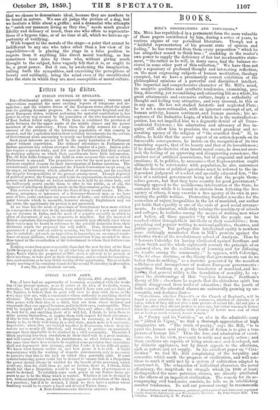Itttrrs III tip &au.
AN INDIAN COUNCIL TN ENGLAND.
Sin—Continental politics are temporarily in suspense ; rumours and expectations supplant the more exciting reports of telegrams and de- spatches ; and the relative forces of the European states afford the silent rule for guiding dynastic progress. No one can compare England and the great European states, without reckoning the material contribution to her power in every way secured by the possession of the two hundred millions of East Indian fellow subjects. With them is combined the provision of noble fortunes for the upper ranks of the middle classes and the poorer members of the aristocracy. From them the daily demand for a large amount of the products of the labouring population of this country is created, and the capitalists find in their territory investments for the service of Government alone amounting to nearly one hundred millions.
Such great interests are yet left by the party legislation of Parliament almost without supervision. The ordinary attendance in Parliament on Indian questions has seldom averaged the number of a jury. Indian poli- tics require a special study, and few men in Parliament find their account in studying subjects on which their constituents have little information. The old East India Company did fulfil in some measure this want to which Parliament is unequal. The proprietors were for the most part men whose interests supplied reasons for their investigation of Indian questions. The revolutionary spirit which animated the French Convention swept away, in its anger, an institution which admitted of improvement, and far excelled the despotic irresponsibility of the present arrangement. Though deprived of political power, the Company still holds its organization, its members still possess such knowledge on Indian matters as is held by no other body, and its half-yearly courts enable them to offer to the public, as of old, the opinions of intelligent English minds on the Government policy in India. This service it would be well for the State if they would render. The ob- stinacy, arrogance, or ignorance of a Governor-General may, as we have seen of late, easily endanger our possession of India; and without a rallying point towards which to assemble, however strongly Englishmen may see the error, the opportunity for protest is not presented. At no time has the mode of procedure of Government been more critical in consequences than now in the intended imposition of a new and untried tax on incomes in India, and the need of a popular assembly in which to allow of discontent, if any, to evaporate, is manifest. But the interest of British capitalists also requires that some assembly may officially exist where their voices may be heard in reference to the possible deduction from their dividends which the projected tax will inflict. True, Government has guaranteed 5 per cent on railway security, but the taxes of the State must also be satisfied ; yet such an imposition is impending on an annual remit- tance of many millions, without any representation being accorded to those thus taxed in the constitution of the Government to whom their fortunes arc subject.
Nothing seems then more reasonable than that the new by-law of the East India Company should be used by all who take an interest in Indian ques- tions, tinder which the proprietor of 1001. stock is allowed to be present at their meetings, to take part in their discussions, and to submit for considera- tion such motions as he may think worthy of the opportunity. The next half- yearly meeting of the company stands for the second Wednesday in December.


























 Previous page
Previous page